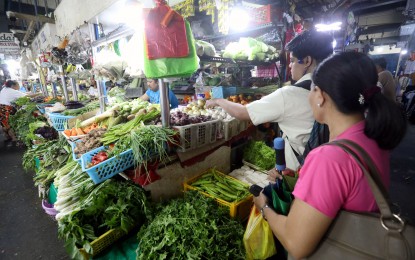
HEADLINE INFLATION. The Bangko Sentral ng Pilipinas says on Monday (April 1, 2024) that price increases in rice, meat, and oil likely caused upward price pressures in March. The BSP expects inflation to settle within 3.4 to 4.2% in March. (PNA photo by Yancy Lim)
MANILA – The Bangko Sentral ng Pilipinas (BSP) expects March 2024 headline inflation to settle within 3.4 to 4.2 percent.
"Continued price increases of rice and meat along with higher domestic oil prices and electricity rates are the primary sources of upward price pressures for the month," the BSP said in a statement on Monday.
The central bank said, however, that lower prices of fruits, vegetables, and fish along with the peso appreciation could contribute to downward price pressures.
"Going forward, the BSP will continue to monitor developments affecting the outlook for inflation and growth in line with its data-dependent approach to monetary policy decision-making," said the BSP.
Headline inflation settled at 3.4 percent in February this year.
Official March 2024 headline inflation data will be released on Friday.
The World Bank, meanwhile, expects Philippine headline inflation to settle within the government's 2 to 4 percent target range.
In its Macro Poverty Outlook released on Monday, the World Bank projected inflation to hit 3.6 percent this year.
Headline inflation is forecast to decelerate to 3.0 percent in 2025 and 2026.
"Upside risks to inflation include the possibility of supply disruptions due to ongoing geopolitical tensions, further trade restrictions, weakness in agriculture output due to El Niño and extreme weather events, and wage pressures from tightness in labor market conditions," the World Bank said. (PNA)
